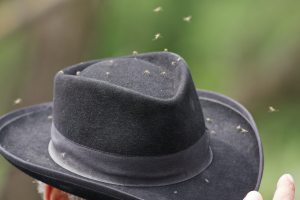 Are mosquitoes running you off your porch in the evenings? If so, you are not alone. My social media feed is full of people asking for advice on how to get rid of these pests, especially now that four cases of malaria have been locally acquired in Sarasota County. There’s a lot of advice out there, but not all of it is good. What does the research say?
Are mosquitoes running you off your porch in the evenings? If so, you are not alone. My social media feed is full of people asking for advice on how to get rid of these pests, especially now that four cases of malaria have been locally acquired in Sarasota County. There’s a lot of advice out there, but not all of it is good. What does the research say?
Bad News
Let’s get the bad news out of the way first. A lot of commonly recommended strategies have not been shown effective in studies. Among them are citronella candles, smart phone apps, and plug-in ultrasonic devices. Wearables such as bracelets, bands, and patches do not provide good protection either. Even wristbands containing DEET were shown in a study to provide zero minutes of protection from mosquitoes.
 My neighbors have an electronic bug zapping lantern on their porch, but those have not been scientifically proven effective, and they kill lots of other insects besides mosquitoes- some of which are beneficial. This is one reason why you should use area-wide chemical sprays and foggers as a last resort. Another reason is because these types of sprays only work for 1-3 weeks, depending on the weather, type, and chemical applied. New mosquitoes simply fly over from next door, and when you use the same chemical over and over again, the insects build up resistance to it.
My neighbors have an electronic bug zapping lantern on their porch, but those have not been scientifically proven effective, and they kill lots of other insects besides mosquitoes- some of which are beneficial. This is one reason why you should use area-wide chemical sprays and foggers as a last resort. Another reason is because these types of sprays only work for 1-3 weeks, depending on the weather, type, and chemical applied. New mosquitoes simply fly over from next door, and when you use the same chemical over and over again, the insects build up resistance to it.
Planting “mosquito-repelling” plants isn’t effective. Simply growing lemongrass or rosemary or scented geraniums around your patio does nothing to repel them. My nine-year-old daughter loves carnivorous plants and suggested that we hang pitcher plants all around our front porch to lure the mosquitoes to their death. I’m afraid we would have to create a carnivorous plant jungle for that to work. For a “mosquito repelling” plant to help, you would need to crush the leaves to release the essential oils and rub the leaves on your skin. According to the USDA, farmers in the early 20th century would crush beautyberry leaves and place them under the harnesses of their horses as a repellant. The Agricultural Research Service found that beautyberry contains two chemicals that keep bugs away, callicarpenal and intermedeol.

So, what can you do?
The CDC recommends that people use repellent containing DEET, wear loose-fitting long-sleeve shirts and pants, and use screens on windows and doors. The University of Florida conducted studies on many mosquito repelling sprays and their active ingredients. They measured the average complete protection time from mosquito bites for each one. Sprays containing DEET as the active ingredient offered complete protection from 1.5 hours to 5 hours, with the active ingredient concentration between 4.75% DEET to 23.8% DEET, respectively.
 Products that contained 10% citronella as the active ingredient only gave 20 minutes of complete protection. Spraying yourself in repellent isn’t an appealing process, especially for the aforementioned carnivorous plant lover who protests loudly when she sees the can come out. Friends have recommended Avon products called Skin So Soft for her. People swear by these, and Avon has released several formulations under the Skin So Soft line. However, the Skin So Soft Bug Guard only gave 10 minutes of protection time in the UF study.
Products that contained 10% citronella as the active ingredient only gave 20 minutes of complete protection. Spraying yourself in repellent isn’t an appealing process, especially for the aforementioned carnivorous plant lover who protests loudly when she sees the can come out. Friends have recommended Avon products called Skin So Soft for her. People swear by these, and Avon has released several formulations under the Skin So Soft line. However, the Skin So Soft Bug Guard only gave 10 minutes of protection time in the UF study.
Good News
Fortunately, there is an alternative to the spray-on DEET that doesn’t have a weird smell and sticky feel. The University of Maine says that repellents containing the active ingredient picaridin can be just as effective as DEET. Picaridin is derived from pepper and isn’t sticky or smelly. Picaridin products have been available in the U.S. since 2005 and comes in lotion and spray form. I ordered the lotion online. It felt very light and had no smell at all. I found it to be less yucky feeling than most sunscreens. Another plant-based option is the active ingredient oil of lemon eucalyptus. This ingredient is just as effective as a 20% concentration of DEET, but not as long lasting. It should not be used on children under the age of three and can cause significant eye irritation.
The best way to lower the levels of mosquitoes in your yard is to get rid of containers of standing water that might be hiding around your property. Mosquitoes can lay eggs and multiply in as little as a bottle-cap full of water. For birdbaths and rain barrels, use a product containing Bacillis thuringiensis israelensis, or Bti for short. This is an organic bacteria used in products called mosquito dunks or mosquito bits that can be sprinkled into rain barrels, bird baths, plant saucers, or anywhere you have standing water. It prevents the larvae from becoming adult mosquitoes but does no harm to bees, birds, pets, or anything other than fungus gnats, blackflies, and mosquitoes.
While you are outside checking for standing water, don’t forget the bromeliads in your landscape beds that may be harboring mosquito larvae. Once every few days you will need to blow the water out of them with a leaf blower or shoot the old water out and fresh water in with the garden hose.
What’s my favorite method of mosquito control? A strong fan aimed at the front porch swing where I am sitting with a book and coffee. It serves two purposes. Mosquitoes can’t fly well in strong wind, and it keeps me cool to boot. The University of Florida repellent study can be found online at edis.ifas.ufl.edu/publication/IN419 or by searching for IFAS Mosquito Repellents.
______
This article was written by Tonya Ashworth, Extension Agent, Duval County, Florida
 2
2




